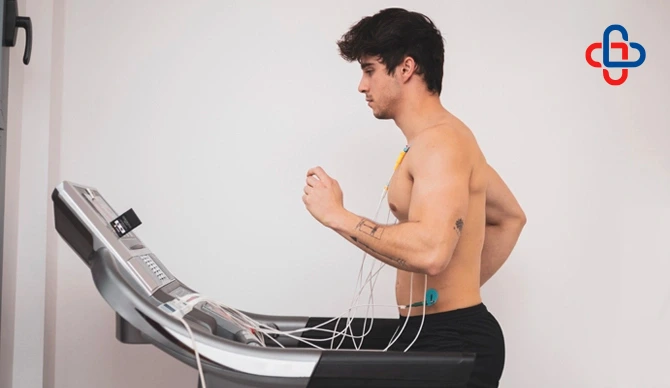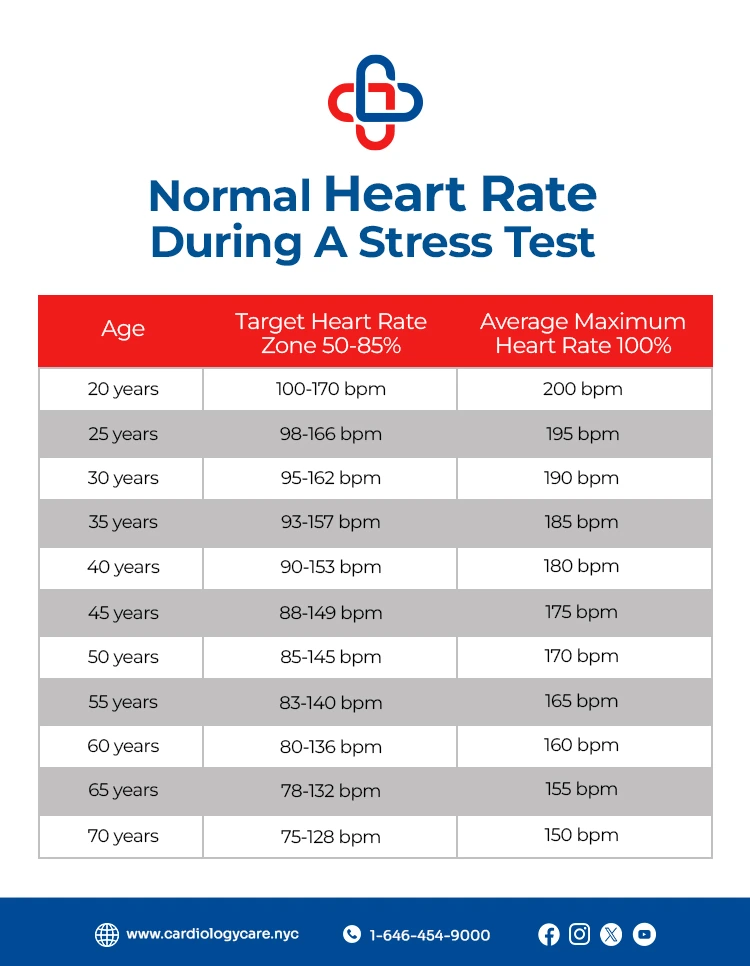During a stress test, understanding the normal heart rate range is essential for evaluating cardiovascular performance. As the body experiences controlled physical stress, the heart responds by increasing its rate to meet oxygen demands. Normal heart rates during stress tests vary depending on individual factors such as age and fitness level.
Monitoring these rates helps healthcare professionals assess heart function under exertion, aiding in the diagnosis and management of heart conditions. This information guides accurate diagnosis and informs personalized treatment plans to optimize heart health and overall well-being.
Table of contents
What is a Stress Test?
A stress test assesses heart function under physical exertion, typically through exercise or medication-induced stress. It monitors heart rate, blood pressure, and electrocardiogram changes to detect cardiovascular abnormalities like coronary artery disease or arrhythmias. This heart rate parameter for stress test evaluation of cardiac health guides treatment decisions and assesses overall cardiovascular fitness.
Purpose of a Stress Test
The primary goal is to assess cardiovascular health, detect coronary artery disease, and evaluate heart function under stress conditions. It helps diagnose chest pain, irregular heartbeats, and overall heart fitness.
What is a Normal Heart Rate?
The normal heart rate varies with age and physical condition. For adults, resting heart rate ranges from 60 to 100 bpm. During exercise, it increases but should stay within a safe range based on individual health parameters.
What Is The Normal Heart Rate During A Stress Test?
During a stress test, a normal heart rate should reach 50% to 85% of your maximum heart rate. This Stress test heart rate range ensures your heart is appropriately stressed to assess its response and function under exertion.
Abnormal Heart Rate During Stress Test
An abnormal heart rate could indicate underlying heart conditions such as arrhythmias or inadequate cardiovascular response to stress. Further evaluation and medical intervention may be necessary.
Significance of Heart Rate in Stress Test Diagnosis
- Indicator of Cardiovascular Fitness: Heart rate response during stress tests reflects how efficiently the heart adapts to increased demands, indicating overall cardiovascular fitness.
- Detection of Ischemia: Abnormal heart rate patterns can indicate insufficient blood flow to the heart (ischemia), a key marker for coronary artery disease.
- Assessment of Medication Effectiveness: Monitoring heart rate helps assess the effectiveness of heart medications in managing conditions like hypertension or arrhythmias.
- Risk Stratification: Heart rate variability and response provide insights into the risk of future cardiovascular events, aiding in risk stratification for patients.
- Guide for Treatment Planning: Heart rate data guides treatment planning by helping healthcare providers determine appropriate exercise prescriptions or surgical interventions.
- Diagnostic Tool for Arrhythmias: Rapid heart rate patterns observed during stress tests can indicate underlying arrhythmias, prompting further diagnostic tests or treatments.
Factors Affecting Heart Rate During Stress Test
- Age: Older individuals tend to have lower maximum heart rates and may reach their target heart rate at lower exercise intensities compared to younger individuals.
- Fitness Level: Those who are physically fit often have lower resting heart rates and can achieve higher target heart rates during exercise.
- Medications: Certain medications, such as beta-blockers or calcium channel blockers, can lower heart rate response during stress tests.
- Health Conditions: Pre-existing heart conditions, such as coronary artery disease or arrhythmias, can affect heart rate responses during exercise stress testing.
- Stress and Anxiety: Emotional factors can cause irregular heartbeat, potentially elevating it above expected levels during the test.
- Body Position: Changes in body position during the test, such as standing or lying down, can affect heart rate readings.
Understanding these factors helps healthcare providers interpret heart stress test results accurately and tailor treatment plans accordingly.
Frequently Asked Questions
How high should your heart rate get during a stress test?
Aim for 50-85% of your maximum heart rate predicted during a stress test, calculated as 220 minus age.
Is a heart rate of 180 during a stress test normal?
A heart rate of 180 during a cardiac stress test can be normal, especially for younger individuals.
What if my heart rate doesn’t reach the target during the stress test?
If your heart rate doesn’t reach the target, your doctor may use medication to induce stress or assess other factors.
How long is a stress test?
A stress test typically lasts 15-20 minutes, varying based on protocol and patient condition.
Does chest pain affect stress test?
Yes, chest pain can affect a stress test by potentially influencing heart rate and ECG readings, complicating the assessment of cardiovascular function under stress. It’s important to monitor and manage chest pain during testing to ensure accurate results and patient safety.
Do you need an exercise stress test for your heart health?
An exercise stress test is recommended if you have symptoms like chest pain, shortness of breath, or risk factors for heart disease. It helps assess heart function under stress, guiding diagnosis and treatment for better heart health management.
How serious is Coronary artery disease?
Coronary artery disease is serious as it can lead to heart attacks and heart failure. It restricts blood flow to the heart due to plaque buildup in arteries, increasing risks of complications without proper management including lifestyle changes, medications, or interventions like angioplasty or bypass surgery.
What is pharmacologic stress testing?
Pharmacologic stress testing involves using medications instead of exercise to induce stress on the heart. It’s used when physical exercise isn’t possible due to health reasons, helping evaluate heart function and detect coronary artery disease or other cardiovascular conditions.
Disclaimer:
This blog is for informational & educational purposes only, and does not intend to substitute any professional medical advice or consultation. For any health related concerns, please consult with your physician, or call 911.
Read More Related Blogs:

